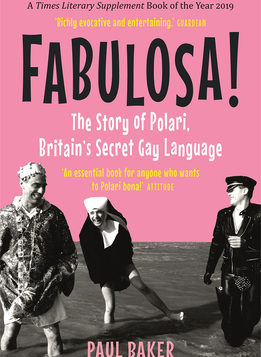 Fabulosa! The Story of Polari, Britain’s Secret Gay Language
Fabulosa! The Story of Polari, Britain’s Secret Gay Language
by Paul Baker
Reaktion Books. 320 pages, $27.50
“SO BONA TO VADA. Oh you/ Your lovely eek and/ Your lovely riah,” sang Morrissey in “Piccadilly Palare” from his 1990 album Bona Drag. “The Piccadilly Palare/ Was just silly slang/ Between me and the boys in my gang,” he reminisces about “Dilly boys” (swishy youth who engage in cruising and prostitution). “On the rack I was/ Easy meat, and a reasonably good buy.”
Morrissey was reviving a nearly extinct argot: Palare, Parlyaree, or Polari. The line translates to, “So good to see you, your lovely face, and lovely hair.” Morrissey’s lyrics condense many cultural and linguistic characteristics of Polari. It borrowed from Italian and French (“bona” from buono or bonne, “vada” from vedere) and Cockney Rhyming Slang or Backslang (“riah” inverts “hair”; “eek” is shortened from “ecaf,” face). By the 20th century, Polari had evolved from a secret language of the homosexual, the molly, and the criminal underworld in England.
Paul Baker, a linguistics professor at Lancaster University, has made it the focus of two decades of study and promotion. Fabulosa! presents an engaging version of his dissertation (published as Polari: The Lost Language of Gay Men in 2002). He easily shifts between the complex linguistic genealogy of Polari and its gay cultural history, focusing particularly on the vicissitudes of its usage in the past half century and tracking this usage with gay politics. Polari enjoyed its heyday in 1960s England thanks to a recurring, campy skit on a BBC radio show. It then almost faded away after the decriminalization of homosexuality in the U.K. in 1967. Baker is bemused and delighted that it has seen a resurgence in this millennium, although perhaps for politically compromised reasons.
Vernon Rosario is a historian of science and child psychiatrist with the Los Angeles County Department of Mental Health and associate clinical professor of psychiatry at UCLA.







